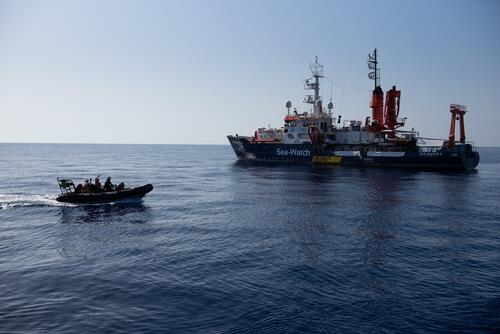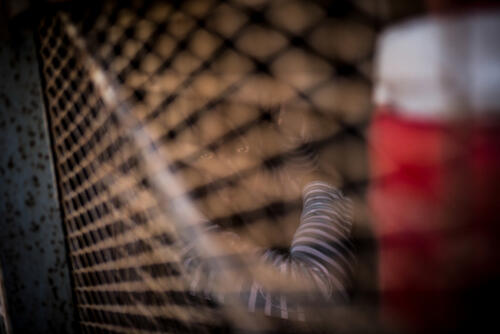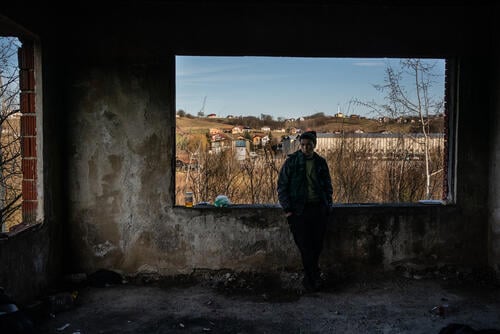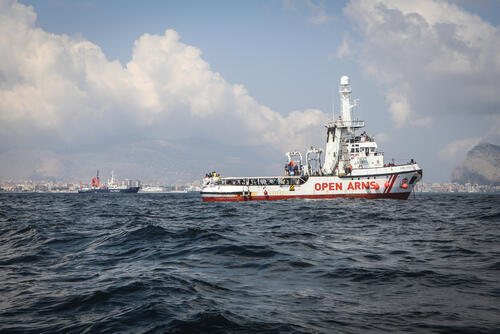Palermo, Italy - More than a month since the search and rescue vessel Sea-Watch 4 was detained in Palermo, Italy, administrative blockages continue to prevent the vessel from returning to the central Mediterranean sea, said Médecins Sans Frontières (MSF). The comments come as a legal appeal is lodged by Sea-Watch, the ship’s owners, with an Italian administrative court, challenging its continued detention.
MSF works in collaboration with Sea-Watch on board the Sea-Watch 4, providing medical care and supporting with humanitarian assistance for rescued people. We have a team on standby waiting for the ship to be released, so they can return to saving lives. Our team are paralysed as the situation in the central Mediterranean remains dire. This week alone has seen the deaths of nearly 20 people, including two children and a pregnant woman, with five more people presumed dead or missing, following another incident.
“Since 19 September, the Sea-Watch 4 has been unable to sail, unable to resume operations, effectively trapped”, said Beatrice Lau, MSF Head of Mission. “At least 80 people, possibly many more, have lost their lives in the central Mediterranean since the ship was impounded. Hundreds more have been forcibly returned to Libya, where they may be subject to torture and abuse.”
The Sea-Watch 4 has been unable to sail, unable to resume operations, effectively trapped... At least 80 people have lost their lives since the ship was impounded.Beatrice Lau, MSF Head of Mission
While MSF recognises and respects the importance of port safety controls as an essential component of maritime law, we fear that the decision of the Italian authorities is politically motivated and relies on a preposterous interpretation of maritime law and safety regulations that only aims to obstruct the Sea-Watch 4’s rescue operations at sea. After an 11-hour-long inspection on board the Sea-Watch 4 by Italian port authorities on 20 September, the ship was slapped with a detention order on the basis of a laundry list of irregularities ranging from several non-functioning lights to some that are simply impossible to address.
For example, one of the irregularities levelled by Italian authorities is the fact that, as a result of rescue operations and transhipment operations in late August, the Sea-Watch 4 carried 354 people, which exceeds the total number of persons for which lifesaving appliances can be provided on the ship. Such an interpretation disregards the fact that rescue operations, the duty of ship masters to provide assistance to people in distress at sea, are enshrined in the International Convention on Maritime Search and Rescue.
The interpretation is all the more reprehensible given that, on 29 August, the ship was instructed by the Maltese authorities to take on board more people from another search and rescue ship after it was forced to call for help while in the Maltese search and rescue region. At that same time, the Italian coast guard vessels were also on scene and evacuated 49 vulnerable people, with Sea-Watch 4 taking onboard the 152 remaining survivors.
“In a spirit of cooperation we have worked hard to fix what we can, despite some of the stated irregularites being too minor to justify detention,” said Barbara Deck, MSF Project Coordinator on board the Sea-Watch 4. “The rest are quite frankly impossible to meet – for example, the ship’s flag-state, Germany, simply does not provide the type of certification required by the Italian authorities, which makes this irregularity impossible to rectify. For this reason, we fear that legitimate procedures and maritime law are being weaponised by the Italian authorities to stop search and rescue activities.”
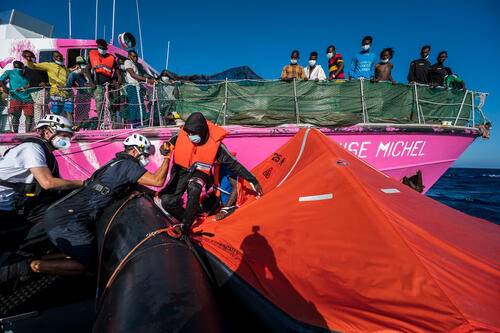
The detainment of the Sea-Watch 4 is part of a deadly pattern preventing NGOs from carrying out lifesaving activities, in line with international and domestic law. When impounded, the Sea-Watch 4 was the fifth NGO search and rescue vessel to be detained in Italian ports in as many months. On 10 October, the NGO ship Alan Kurdi was detained for the second time in six months in Sicily. On 22 October, the Banksy-funded rescue vessel Louise Michel announced that it was also unable to leave port as its registration was being challenged.
EU governments have taken away search and rescue capacity from the world’s deadliest sea border. That they do this simultaneous to pledging a more humane approach to migration in their recent migration pact, is tragically paradoxical. If EU states are unwilling to do their jobs, the very least they can do is let NGO search and rescue vessels do theirs.
Recent events in the central Mediterranean have exposed the fatal consequences of the decision of European member states to repeatedly disregard their legal and moral duty to save lives, while opting instead to impose abusively bureaucratic and administrative measures on lifesaving assets. Since the detainment of the Sea-Watch 4, at least 80 people have died in shipwrecks off the coast of Libya and Italy. In one case, a boat with 12 people has drifted the central Mediterranean for 10 days, with five people presumed missing or dead. Yet, the authorities only launched an operation four days after having received information on the distress case.
At the same time, the EU continues to fund and train the Libyan Coast Guard despite its own recognition that Libya is not a safe place of return. On 8 October, two ships belonging to the Libyan Coast Guard returned to Libya after undergoing substantial repairs paid for by Italy and the EU. These ships will be used to capture people at sea and return them to the very place they are trying to flee.
So far in 2020, at least 506 people have lost their lives in the central Mediterranean, and nearly 9,000 have been forcibly returned to Libya.



